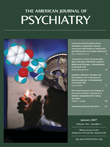A Comparison of Aripiprazole, Methylphenidate, and Placebo for Amphetamine Dependence
Abstract
Objective: Problems related to illegal amphetamine use have become a major public health issue in many developed countries. To date, evidence on the effectiveness of psychosocial treatments has remained modest, and no pharmacotherapy has proven effective for amphetamine dependence. Method: Individuals meeting DSM-IV criteria for intravenous amphetamine dependence (N=53) were randomly assigned to receive aripiprazole (15 mg/day), slow-release methylphenidate (54 mg/day), or placebo for 20 weeks. The study was terminated prematurely due to unexpected results of interim analysis. An intention-to-treat analysis was used. The primary outcome measure was the proportion of amphetamine-positive urine samples. Results: Patients allocated to aripiprazole had significantly more amphetamine-positive urine samples than patients in the placebo group (odds ratio=3.77, 95% CI=1.55–9.18), whereas patients who received methylphenidate had significantly fewer amphetamine-positive urine samples than patients who had received placebo (odds ratio=0.46, 95% CI=0.26–0.81). Conclusions: Methylphenidate is an effective treatment for reducing intravenous drug use in patients with severe amphetamine dependence.



